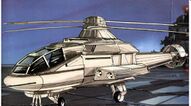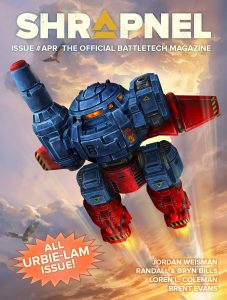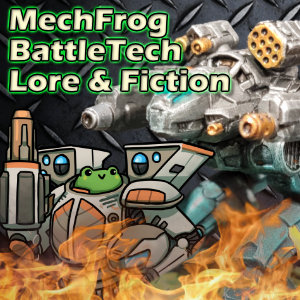Warrior (Combat Vehicle)

| |
| Warrior H-7 | |
| Production information | |
| Manufacturer | Lockheed-CBM Corporation |
| Mission | Fire Support |
| Type | VTOL |
| Cost | 548,250 C-bills |
| Technical specifications | |
| Mass | 21 |
| Armor | Longanecker PlastiSteel |
| Engine | 70 I.C.E. |
| Speed | 162 km/h |
| Crew | 1 |
| Armament |
1 x Autocannon/2 |
| BV (1.0) | 406[1] |
| BV (2.0) | ??? |
Contents
Description
First produced in 2950, the Warrior H-7 Attack Helicopter is a common sight across the Inner Sphere, serving as a highly mobile fire support unit.
Privately designed by Lockheed-CBM as a cheaper and more easily produced substitute for Light BattleMechs in the notorious top-heavy and sluggish Lyran Commonwealth Armed Forces' Third Succession War era BattleMech regiments, the Lyran High Command originally dismissed the Warrior as a worthless "flying toy" in 2957 until the 9th Battle of Hesperus that same year damaged Defiance Industries facilities to the point the LCAF were desperate for any military hardware, placing heavy orders and ensuring continued production since.
The aircraft itself is a standard rotary wing design. The two counter-rotating rotor systems negate the need for a tail, as there is no drive torque to be canceled. Capable of speeds of 162kph, the Warrior can range across the battle field with ease, its ability to serve as a recon unit enhanced by its ability to drop 250 kilograms of remote sensors.
Many Warriors are assigned to garrison units and air-mobile infantry regiments to provide quick response fire support, where tactically the VTOL is best used to engage its target at long range without being tied to the defense of a specific location. The life of the Warrior's relatively fragile frame can be measured in seconds if drawn into close range combat with armor or 'Mechs.
Armament
The Warrior is designed around a center line-mounted SarLon Autocannon/2. While not as powerful as some autocannons, the extremely long range of the weapon allows the Warrior to engage outside the range of most other foes, slowly wearing down their armor. To provide close-in protection against targets that cannot be effectively engaged within the minimum range of the SarLon, the Warrior mounts a TharHes SRM-4 rack. Both are mated to a N&D Handsfree tracking and targeting system linked to the pilot's helmet, allowing the pilot to merely look at what he wants to target and pull the trigger. One ton of reloads each give the helicopter decent endurance in combat.
Variants
- H-7A - The 7A variant drops the missile launcher for a Machine Gun with half a ton of ammunition, freeing up enough space to upgrade the autocannon to a SarLon MaxiCannon 5. BV (1.0)= 399[1], BV (2.0)= ??
- H-7C - The Warrior H-7C substitutes a Valiant Heavy CrossBow LRM-10 Rack with a ton of reloads for the Sarlon AutoCannon. BV (1.0)= 721[1], BV (2.0)= ??
- H-8 - First proposed in July 3048, the H-8 upgrade uses recovered technology to enhance the Warrior's performance. The main change is replacing the old ICE with a lighter Lockheed-70 Fusion Engine, with the autocannon replaced by a Longfire V LRM-10 and two Hovertech Streak SRM-2 launchers in place of the older SRM-4. Protection is improved with a switch to Ferro-Fibrous plating, originally Kallon Unity Weave sourced from the Kallon Industries facility in the Wernke-Talon system, but after the break-up of the Federated Commonwealth Lockheed was forced to substitute the original inferior armor until securing local supplies from Lexington Limited after the FedCom Civil War. BV (1.0) = 548, BV (2.0) = 419[2]
- H-9 - A post-FedCom Civil War variation of the H-8, the 9 replaces all the missile launchers with a Thor Rotary 40mm autocannon. BV (2.0) = 484[3]
- H-10 - An even more radical variation of the H-8, the H-10 was redesigned as a Battle Armor transport, trading all weaponry for two Heavy Machine Guns while freeing up the space required for a five-ton Infantry Bay. BV (2.0) = 180[4]
Custom Variants
- HX-9 - An experimental variant developed by the Capellan Confederation around 3073, the HX-9 is powered by a Fusion Engine - XL and equipped with nearly all the new technologies available to the CCAF in this era. It is armed with a prototype Hypervelocity Autocannon/2 and protected with Vehicular Stealth Armor, Guardian ECM Suite and CASE. A VTOL Jet Booster allows this craft to reach incredible speeds in short bursts, long enough to escape anything that threatens it.[5]
Gallery
References
- Technical Readout: 3026, pp. 16-17
- Technical Readout: 3026 Revised, pp. 20-21
- Technical Readout: 3039, pp. 26-27
- Technical Readout: 3058, pp. 14-15
- Technical Readout: 3058 Upgrade, pp. 58-59




